|
|
.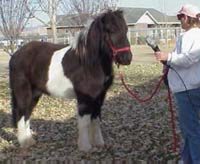
Focusing on the clippers |
Getting Familiar with the Clippers
By Marie Gulliford
|
The first step is to familiarize yourself with the
area you will be working in. Look to see where the outlets are. Plug in your
clippers and see how far they will go. Find out just what space you will be
able to work in comfortably. Practice as if the horse were present. This is
important so you can tell where the cord will go. You will also have to be able
to move the clipper about some. It helps if you can turn the clipper over in
your hand with out having to look at it, or use your other hand to turn it.
Familiarize yourself with the on/off switch. Try to turn it on and off with the
hand you use to hold the clipper. Being able to do these things with the
clippers will make it easier for you if you need to move in a hurry. Another
thing to remember is that the clipper blade will heat up. Check it often to be
sure it isn't so hot that it hurts your horse.
This is an area of training where negative reinforcement plays a role. You can
pair it with positive reinforcement for faster results. The question of what to
do with your horse is one only you can answer. I normally work with the horse
on a lead rope. It is not necessary. It is helpful if the horse does not have
an acre of space. I show the horse the clippers. I let the horse sniff the
clippers.
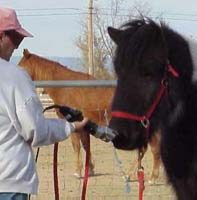
Targeting. They are not yet turned on. |
I do not train the
horse to target the clippers. Clippers can be dangerous for the horse to lip or
bite. Most horses will sniff the clippers. I then pat the horse with the
clippers in my hand. This will cause the cord to flop about since the clippers
are not plugged in. If your horse is already dancing this is what you need to
work on. Click and reward for any signs of calmness. As soon as you click move
the clippers and cord away from your horse (negative
reinforcement). |
Continue until your horse is calm with the clippers and cord flopping all
around. If your horse is still standing quietly you can plug in the clippers
and turn them on well away from the horse. Let your horse hear them for 30
seconds to a minute. Talk nice soothing talk to your horse. If your horse is
calm, time for the next step. If your horse is nervous turn the clippers on and
off repeatedly until your horse ignores the noise. (this is called flooding or
desensitization) Click and reward your horse for ignoring the noise of the
clippers. (positive reinforcement) Now walk towards your horse with the
clippers running in your hand. Your hand should be at your side. Do not
approach your horse with the clippers outstretched towards her/him. Repeat the
patting of the horse as you did before, but now the clippers are running.
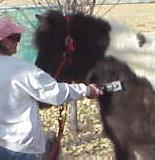
Allowing himself to be touched by
clippers. |
You are not
clipping the horse. BR If your horse is still quite nervous pat the horse with
your hand between the clipper and the horse. If your horse is a bit more
tolerant, pat the horse with the side of the clipper. Click and reward for
tolerance and calm demeanor. One of the rewards you can give is to turn off the
clipper for a brief time. I usually turn off the clipper for 5-15 seconds as a
reward. (more use of negative reinforcement) Now that your horse is calm about
the clipper running nearby it is time to actually do some
clipping!!! |
Start with the clippers rocked back, the tip of the blade pointing up and away
from the skin of the horse, make a swipe without cutting. Now lower the blade a
tiny bit, just enough so that some hair gets cut but not right to the skin.
This is so that if your horse moves you won't jab him/her with the clipper. The
horse may move because the sound will change as you start cutting hair. The
feeling of the clipper will also change. I clip about two inches then turn off
the clippers and reward the horse. If I have properly prepared the horse the
next step of placing the clippers so the blade is parallel to the skin and
clipping a 4 inch swath goes really easy.
| From there I reward randomly.
Sometimes I stop clipping and pat the horse after 10 seconds, sometimes after
30 seconds. The first clipping I don't clip for more than a minute without
stopping. If the horse starts to move away I follow the motion until the horse
stops moving. At that point I turn off the clipper. It is important for you to
be very observant about how nervous your horse is. There is no need to push the
horse to the point of fleeing away from you. If your horse moves away maintain
the distance you were working at until the horse stops moving, then back away
from the horse. |
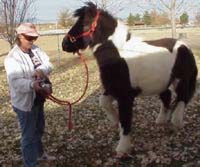
Well, let's turn them on.
Oops, sounds kinda scary! |
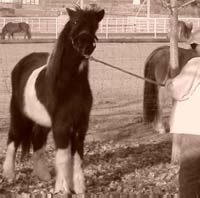
Don't let those things get
me!" |
Keep training at that distance
until the horse no longer moves away. Quit for the day. Do more another day. Be
persistent and calm in your approach. Clip with even, smooth strokes. If you
have not used clippers practice getting a smooth stroke on furniture before you
use them on the horse. The key to acclimating your horse to clippers quickly,
is to turn them off and/or move them away from the horse when the horse is
being good. If you remove them when the horse is acting fearful you will
reinforce that behavior. You can stop clipping and just keep the clippers near
where you were clipping until the horse calms a bit, at which point you turn
off the clippers. |
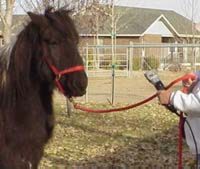
Feeling the vibration through the lead
rope. |
All this sounds like it might
take a long time. If you really focus on rewarding good behavior frequently in
the early stages, progress should happen fast. I normally can have a horse who
has no experience with the clipper standing for clipping in 15-30 minutes.
Horses that have previous bad experiences with the clipper may take an hour or
more depending on how fearful the horse is. |
Marie Gulliford
doghair@worldnet.att.net
http://home.att.net/~doghair/index.html
 |
This article is reproduced with
with the permission of ClickRyder. To learn more about Clicker Training, please
visit their website - click
here
Email: iceryder@cableone.net |
|

